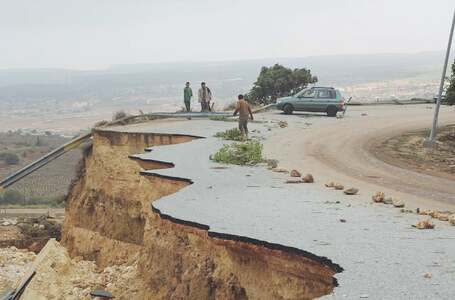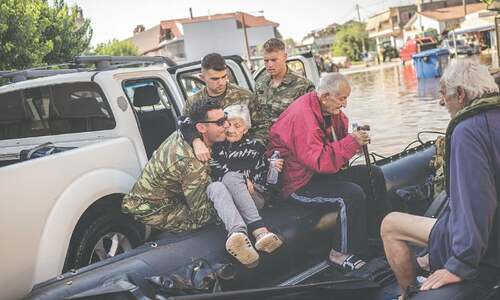Libya was reeling on Wednesday from a massive flood that left nearly 4,000 dead and thousands more missing, wreaking havoc in the eastern city of Derna where bodies wrapped in blankets lined the ravaged streets.
Relief missions gathered pace with Turkey, Egypt and the United Arab Emirates among the first nations to rush aid to the war-scarred country after the disaster that also displaced tens of thousands.
The Mediterranean coastal city of Derna was hit by a huge flash flood late on Sunday that witnesses likened to a tsunami after two upstream dams burst when torrential rains brought by Storm Daniel battered the region.
Footage broadcast by state media showed an apocalyptic landscape in the city, with debris littering streets and people lifting sheets off bodies lying on sidewalks to try to identify them.
Satellite images of Derna after the surge of water showed coastal neighbourhoods almost entirely submerged.
The United Nations has pledged $10 million in support for survivors, including at least 30,000 people it said had been left homeless in Derna.
The wall of water ripped away buildings, vehicles and the people inside them. Many were swept out into the sea, with bodies later washing up on beaches littered with debris and car wrecks.
Traumatised survivors have dug through the mud-caked ruins of shattered buildings to recover bodies, scores of which were lying out in the open before being buried in mass graves.
The confirmed death toll reached 3,840 by Wednesday afternoon, said Lieutenant Tarek al-Kharraz, spokesman for the eastern-based government’s interior ministry.
The figure includes 3,190 victims who have already been buried and at least 400 foreigners, mostly from Sudan and Egypt, Kharraz told AFP, adding that 2,400 people were still missing.
Some media reports have quoted officials giving higher tolls.
Tamer Ramadan of the International Federation of Red Cross and Red Crescent Societies (IFRC) said on Tuesday “the death toll is huge” and is likely to grow.
He added the organisation had independent sources saying that “the number of missing people is hitting 10,000 persons so far”.
‘Epic calamity’
Oil-rich Libya is still recovering from the war and chaos that followed the Nato-backed uprising which toppled and killed longtime dictator Muammar Gaddafi in 2011.
The country has been left divided between two rival governments — the UN-brokered, internationally recognised administration based in Tripoli, and a separate administration in the disaster-hit east.
Derna is ringed by hills and bisected by a riverbed that is usually dry in summer, but which became a raging torrent that also destroyed several bridges.
Mudslides and flooding also hit nearby areas where aid group the Norwegian Refugee Council said “entire villages have been overwhelmed by the floods”.
“Communities across Libya have endured years of conflict, poverty and displacement. The latest disaster will exacerbate the situation for these people.”
Erik Tollefsen, head of the weapon contamination unit at the International Committee of the Red Cross, warned of risks posed by landmines planted during the war.
“Derna flood waters have shifted unexploded ordnance into areas previously free of weapon contamination. This means more risk for survivors and those providing humanitarian assistance,” Tollefsen said on X, formerly Twitter.
Several nations offered urgent aid and rescue teams to help address what one UN official called “a calamity of epic proportions”.
In neighbouring Egypt — which has repeatedly refused to set up camps in the face of refugee crises — President Abdel Fattah al-Sisi ordered on Wednesday “the establishment of shelter camps” for survivors of the Libyan disaster, according to state media.
Rescue effort
Rescue teams from Turkey have arrived in eastern Libya, authorities said, and Algeria, France, Italy, Qatar and Tunisia also pledged to help.
The UAE sent two planes carrying 150 tonnes of aid.
The European Union said assistance from Germany, Romania and Finland was dispatched.
A Kuwaiti flight took off Wednesday with 40 tonnes of supplies, the IFRC said.
Palestinian media reported a rescue mission had left from Ramallah in the occupied West Bank, and Jordan sent a military plane loaded with food parcels, tents, blankets and mattresses.
Climate experts have linked Libya’s deadly disaster to a combination of the impacts of a heating planet and of the country’s years of political chaos and underinvestment in infrastructure.
Hurricane-strength Mediterranean storms such as Daniel — which earlier hit Turkey, Bulgaria and Greece — are known as “medicanes” which can gain strength as warmer air absorbs more moisture.
Climate-linked extreme weather events tend to be the deadliest in strife-torn and poor countries that lack good infrastructure, early warning systems and strong emergency response services.
As the world heats up, Libya’s disaster “is illustrative of the type of devastating flooding event we may expect increasingly in the future”, said University of Bristol climate science professor Lizzie Kendon.


















































Dear visitor, the comments section is undergoing an overhaul and will return soon.